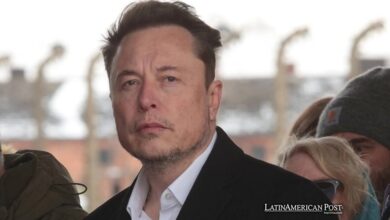Elon Musk’s Twitter Takeover: A Year of Polarization and Disinformation
Elon Musk's year at the helm of X has ushered in a new era, transforming the platform into a hub for right-wing voices, sparking debates over freedom of speech, and raising questions about the spread of disinformation.

Photo: 07/27/2023. EFE/Etienne Laurent /ARCHIVE
EFE
Escucha este artículo
Leer en español: La adquisición de Twitter por parte de Elon Musk: un año de polarización y desinformación
Elon Musk's Impact
In the space of a year since acquiring Twitter, Elon Musk has transformed the digital public square. Musk once described Twitter as "the digital public square where vital issues for the future of humanity are debated." However, his ownership has brought significant change and challenges, leading to a polarization of the platform and an alarming spread of disinformation.
Musk's influence on Twitter was apparent from the beginning. He renamed the platform "X," symbolizing a break from its previous identity and marking the start of a new era. This rebranding was accompanied by a shift in the platform's content, as Musk gave a prominent voice to right-leaning political figures and movements. The result has been a platform that reflects a more conservative political stance.
One of Musk's most notable actions was his declaration of war against the "woke virus," a term often associated with political correctness and left-leaning ideologies. He applied this term to institutions like The New York Times and Netflix, sparking debates about freedom of speech and censorship.
A Platform for the Right
Musk did not hesitate to provide a platform for conservative political figures, including former U.S. President Donald Trump and Florida Governor Ron DeSantis. Both are prominent candidates in the Republican presidential primaries, representing the far-right faction of the party.
Musk's decision to reinstate Trump's Twitter account after it was suspended for "incitement to violence" following the Capitol riot in January 2021 raised eyebrows. Trump's return to the platform was marked by a provocative photo of himself in police custody, taken in a Georgia county jail, where he faces charges related to his alleged attempts to overturn the 2020 election results.
Furthermore, Ron DeSantis launched his 2024 presidential campaign on Twitter, with Musk interviewing him. However, this event was marred by technical glitches, revealing the challenges of using a platform like X for such political endeavors
New Voices on the Platform
Tucker Carlson, the former Fox News host known for his anti-establishment and far-right views, found a new home on X. He now hosts a weekly program on the platform, where he interviews political figures, including libertarian presidential candidate Javier Milei from Argentina.
In his interview with Milei, which garnered over 122 million views, the Argentine candidate accused Pope Francis of sympathizing with "murderous communists" and aligning with "bloody dictatorships." Such content on the platform has contributed to its growing reputation as a hub for right-wing voices.
One of the most significant changes implemented by Musk was the monetization structure of X. He replaced the conventional blue verification checkmark, a symbol of trust, with a subscription model costing around $8 per month for verified accounts. While some high-follower accounts maintained their blue checkmarks without a subscription, this change has introduced chaos in the verification system.
Additionally, X has faced criticism for cutting staff responsible for monitoring content on the platform, leading to a surge in disinformation. During the Israel-Hamas conflict in October, X became a testing ground for its approach to real-time news events. Many premium profiles posted a false statement from the White House, claiming that the U.S. was sending $8 billion in aid to Israel after a Hamas attack. These profiles also shared misleading videos from unrelated conflicts, presenting them as current events in the Israel-Gaza conflict.
Also read: Overcoming Hurdles: The State of AI in Latin America
Regulatory Scrutiny
As concerns over disinformation grew, the European Commission initiated an investigation into X's compliance with European digital services legislation. The analysis aims to address potential illegal content dissemination, terrorist content, incitement to hatred, and misinformation.
Linda Yaccarino, the company's CEO, responded by highlighting their efforts to remove and label content related to the Israel-Hamas conflict and eliminating hundreds of accounts linked to Hamas.
Shaping Online Discourse
Elon Musk's year at the helm of X has ushered in a new era, transforming the platform into a hub for right-wing voices, sparking debates over freedom of speech, and raising questions about the spread of disinformation. The platform's impact reaches far beyond its users, influencing political narratives and public discourse.
As the digital public square continues to evolve, the challenges of maintaining a space for open dialogue while countering disinformation persist. The future of X and its role in shaping online discourse remains uncertain. Still, one thing is clear: the changes brought about by Musk's ownership have had a profound impact on the platform's landscape and the broader online political ecosystem.




